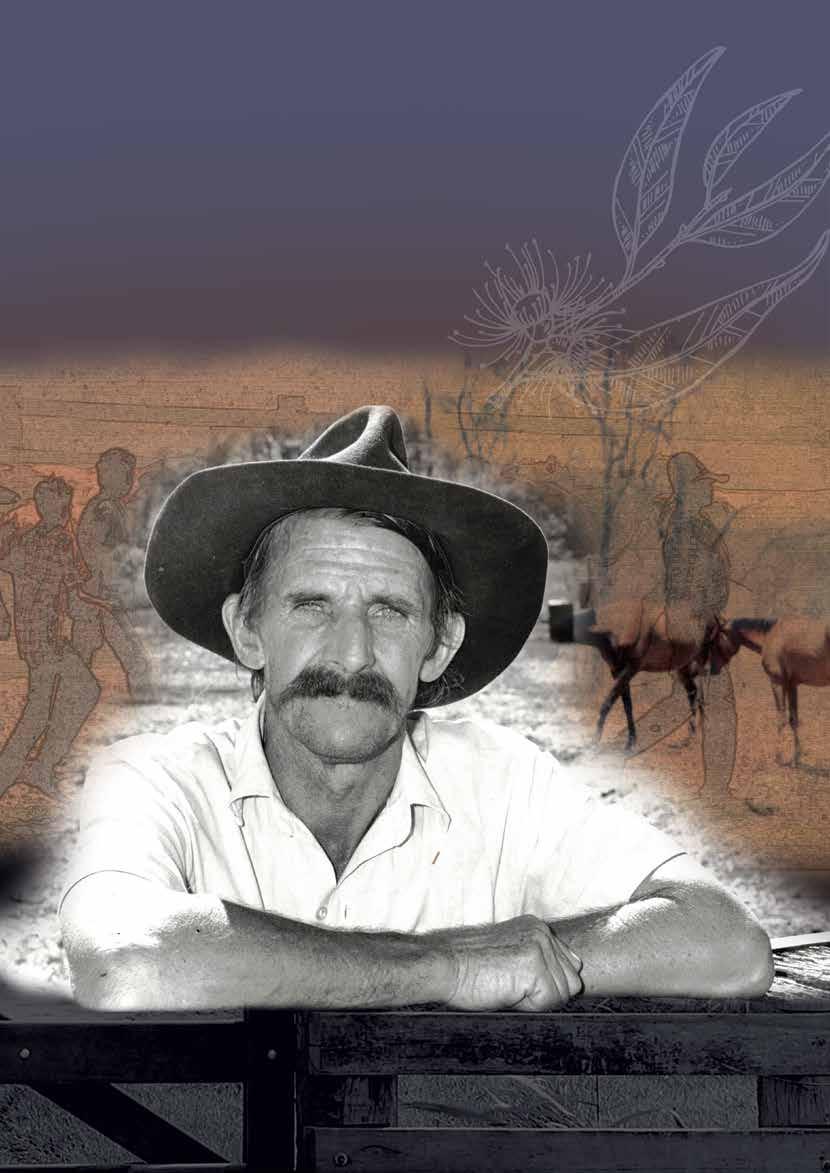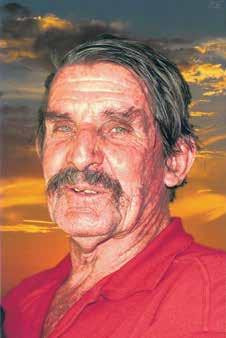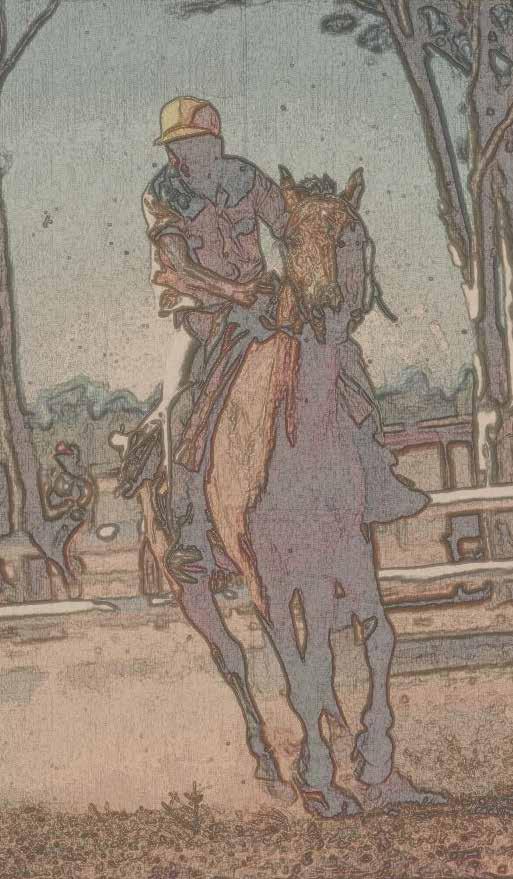
7 minute read
The Geoff Guest Way
by James Michie
Advertisement
The Geoff Guest Way
Young people do better on land, not in detention centres
Geoff Guest


can often reflect past rejection a young person may have experienced in their life. Working through this response to its root causality is key to Geoff’s approach. Being able to encourage a young person to identify, acknowledge and verbalise their own existing fear is often a big step in their developmental progress. This can highlight an established level of trust in the worker-young person relationship through a willingness to expose themselves beyond conditioned behavioural responses such as false bravado.
Highlighting ‘fear’ as a shared emotion felt by a young person and horse begins the process of relationship formation by awakening often dormant emotions of empathy and forgiveness. Pointing out that the horse is equally (if not more so) fearful, confused and untrusting normalises these presenting frustrations and acknowledges them as something shared between a young person and horse. This often has the effect of lessening the severity of these negative emotions for the young person.
Standing in front of a wild brumby can offer a really clear reflection to a young person of themselves in many ways. It’s such a valuable process… often very confronting. But in that interaction and process there’s many of the tools for addressing a lot of what’s been missing in their childhood and adolescence.
Geoff Guest
Geoff believes that allowing the young person to ‘spit the dummy’ and walk away is as important as allowing the horse to have regular breaks when it gives off the signs that it has had enough for the time being.
You can’t come down (on a young person) like a tonne of bricks.. Often you need to back off and do something different… come back to it. If you’re both angry it won’t work.

You never want a young person to fear you. The authoritative, stand over approach used in many jails and detention centres is repeating a really dysfunctional pattern many young people have experienced growing up.
Geoff Guest

Training Farm Recommendations
Changing the status quo
We really need to consider what are the true motivations of Juvenile detention centres and youth intervention programs. Is it to get the young off the streets and away from causing harm to the community?
Or is it a serious commitment to addressing the underlying issues these young people have and preparing them to become functional valued members of society?
If it is genuinely the latter, we need to consider all of these factors together and commit to changing the status quo in terms of service delivery, otherwise this cyclical dysfunction will just continue.
Geoff Guest


It’s important that the program is on remote land. Ideally it should be 50km or more from towns and not situated on a main road. If young people have the option of walking to a nearby highway and hitching a ride into town the moment things become challenging for them, the work we are doing gets set back. This isn’t about being fenced in… Young people often run off and spend a day or two in the bush. It’s about them having this time alone on land and coming back for another go under their own steam. This is them taking control… If town is too close, the temptation’s always there and they can get fixated on it.
“It’s about creating a setting where young people can be exposed to enough of what they need to repair and grow into healthy, functional young adults. Proper nutrition, vitamin supplementation, ECG, mentoring and equine therapy: they’re all about fixing existing deficiencies and when addressed together, it works… I’ve seen it over and over again through decades.
“This is a process. Having a closed training farm environment is a good idea initially. This can have a mix of both mandated and voluntary young people, but it’s important that young people commit to the program for a substantial stint. Six, 12 or 24 months can be truly transformative. Having a consistent length of time for these initiatives to work is important.
“Then the young person can see big changes without dropping in and out for a week here and there which would mean that we just really deal with the immediate symptoms and behaviours. Cutting to the core issues takes time.
I really feel that when a successful trial of this model is up and running and has been evaluated, it could be rolled out across Australia. This would dramatically change the dire state of at-risk young people in Australia. I’ve used these methods extensively and know they work.

Geoff Guest
Accommodation considerations and ‘house parents’
Intake assessment and testing

Having separate houses or buildings for differently aged young people would work much more effectively than housing them all together in a dormitory type set up. For example, age ranges could be: 14-16, 17-19 and 20-21.
Having two workers, a male and female in the roles of ‘house parents’ for each age range is a way of role modelling appropriate behaviours and providing an opportunity for more one on one interaction than a larger group setting would allow. It also means house parents are able to observe more closely any issues or concerns that might easily be missed. Having a four-day on, threeday off roster could work for staff.
Geoff Guest Staff involved in vocational training and equine therapy components of the program must see themselves as mentors and be keen to develop skills and approaches that can work effectively with young people. Geoff is a firm believer that these skills and techniques can be taught and learned.
Workers need to be open-minded, receptive and be wanting to learn new skills and approaches. Having a good grasp of horse [equine] therapy objectives and a strengthsbased approach to working with young people is a good starting point for workers.
I’ll give you an example.... many people around Mt Isa test high for lead and copper. In high levels these metals can be toxic and cause all sorts of problems especially to mental health. Testing for these things is relatively inexpensive and can be life changing.
Geoff Guest
As with the ‘in community’ treatment recommendations, looking at a range of possible impactors is crucial. These include: generational history, family incidences of mental health issues, possible effects of AFS, blood tests to determine hypoglycemia, and hair follicle analysis to determine specific nutrient deficiencies and prevalence of heavy metals.
Training house parents in cooking the appropriate meals for young people is essential. Staying away from wheat, simple sugars, many grains and heavily processed foods is the objective. Rebuilding often chronically damaged gut health should be prioritised through regular consumption of kefir, kombucha, sauerkraut and apple cider vinegar.
Training house parents to become Neurofeedback therapists through a simple short course would be advantageous and help the young people greatly, as well as providing workers with valuable new skills.
Having a naturopath visit the training farm weekly to monitor an individualised vitamin and mineral supplementation program for each young person is essential. Geoff is a keen body worker and has used a range of physical treatment modalities such as trigger point therapy, massage and red laser work to help the boys with injuries and raise awareness around looking after their physical bodies.
This isn’t about replacing medical doctors and psychologists. Some young people need to be on a carefully managed pharmacotherapy program. It’s about these programs running in conjunction with orthomolecular medicine, which aims to address specific nutritional deficiencies.
As much as possible, over the years I’d get the boys up before breakfast for a quick run. It helps set the day up and get them focused for what’s ahead… It needn’t be anything too long but I think science is starting to show that 20 minutes of continuous exercise daily gives tremendous health benefits.

Geoff Guest
Exercise and body work
Geoff has been a long-time advocate of regular exercise in addition to a day’s work.
Geoff Guest Often just the individual focus and care from a worker can be really beneficial to young people who haven’t had that before.
Geoff Guest
Overall program costs
This needn’t be an expensive process. It’s just about shifting the focus to treating the underlying causes of the problem.
Just endlessly treating presenting behaviours has limited success. I’ve found this to be the case and this is the hurdle that many programs that fail never overcome.
I saw a politician recently [Bob Katter in December 2019] on TV talking about it currently costing over $500,000 per year to keep a young person in juvenile detention in Queensland. A properly designed and structured program for a youth training farm could be run for under a quarter of those figures.
Geoff Guest

